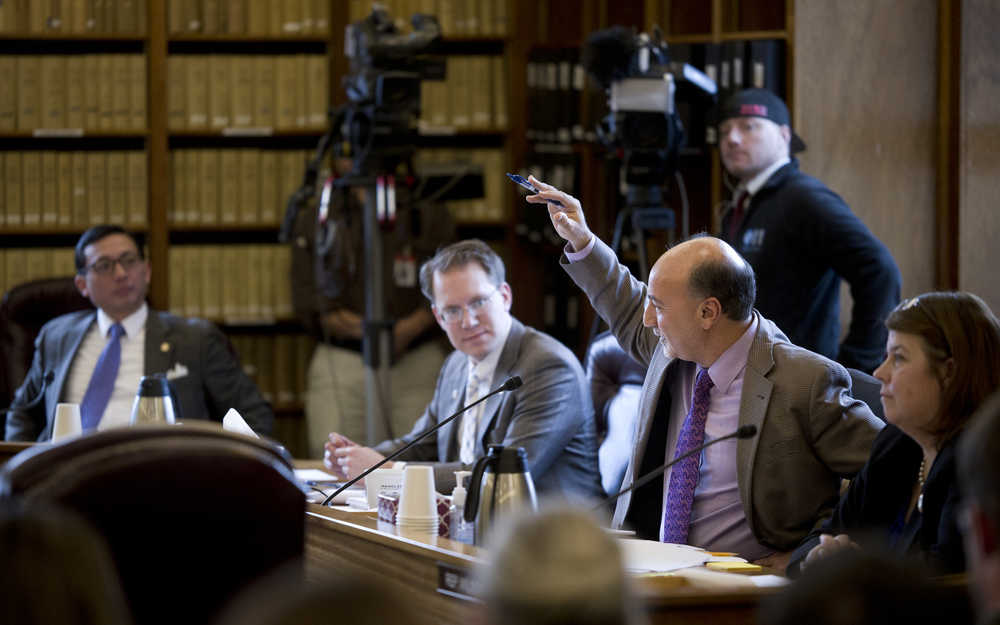The normally staid process of budget amendments was disrupted Tuesday afternoon as Anchorage Republican Lance Pruitt exclaimed that his fellow lawmakers seemed to be playing a budgetary “shell game” after a legislative staffer revealed the state’s Statutory Budget Reserve savings account contains $288 million.
The account was thought to be drained in 2015.
“We’re cutting people left and right, I’m taking huge hits on what we’re doing for the vulnerable, and we just found $288 million in the couch cushions?” said Rep. Lynn Gattis, R-Wasilla and a member of the committee.
The $288 million remains because the state cut more spending than thought in previous fiscal years, and its investments earned more money than it expected. The money is in the Constitutional Budget Reserve, one of the state’s most easily accessible savings accounts.
“We assumed the CBR would be virtually depleted” at the end of the 2015 fiscal year, said Pat Pitney, director of the state Office of Management and Budget.
When it wasn’t, the discovery didn’t come in time for the state to include it in the regular FY16 budget.
The governor’s office instead quietly revealed the discovery in its supplemental budget proposal, released earlier this session. Pitney said the discovery wasn’t concealed, it just wasn’t trumpeted. The figure amounts to less than a month of state operations.
The supplemental budget, part of the normal budget process, includes all the items that come up after the normal budget is finalized — things like natural disasters and, in this case, the buyout of pipeline partner TransCanada.
In a special session last year, the Legislature approved up to $500 million supplemental spending from the Constitutional Budget Reserve, a protected savings account. In a normal year, the Legislature would use the “found” $288 million first, then turn to the Constitutional Budget Reserve if they needed more.
This time around, lawmakers are reversing that order, effectively allowing them to spend more.
“If you look back at the supplementals, we’re going to go from a $4.9 billion budget coming out of session last year to $5.6 billion,” Pitney said.
Pruitt and Gattis, members of the House Finance Committee, are among the legislators considering 45 amendments to a budget plan being drafted by the committee. The budget is expected to be voted upon by the full House later this week, then it will be blended with a budget coming from the Senate later this session.
The comments by Pruitt and Gattis came as the committee considered an amendment establishing a new $30 million grant program to pay for drug abuse treatment. The grant program would be paid with money allocated in the 2016 fiscal year, which is more than half complete. The budget currently under consideration is for the 2017 fiscal year, which starts July 1.
That would mean the program’s expenses wouldn’t show up in the current budget.
“The program itself may be a good program,” Pruitt said, but the Legislature should abide by “truth in budgeting.”
During a break in the hearing, he declined to comment further except to say, “There are creative differences.”
Rep. Mark Neuman, R-Big Lake and co-chairman of the House Finance Committee, went into a closed meeting during the break and could not be reached before press deadline.
Pitney said the Legislature appears to be trying to minimize general fund spending in the FY17 budget at the expense of the FY16 and FY18 budgets.
There’s an obvious but unstated motive for minimizing that kind of spending, which typically is funded with tax revenue: This year is an election year, and Alaskans have repeatedly stated in public testimony that they want to see budget cuts before lawmakers raise taxes or spend the earnings of the Permanent Fund.
At press deadline, the House committee was continuing to hear budget amendments. The Empire will provide a full report in Thursday’s newspaper.

